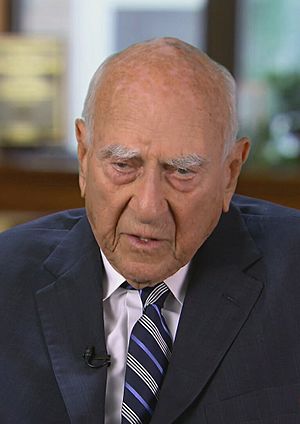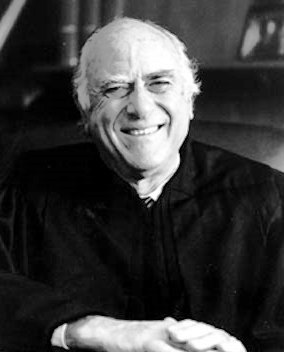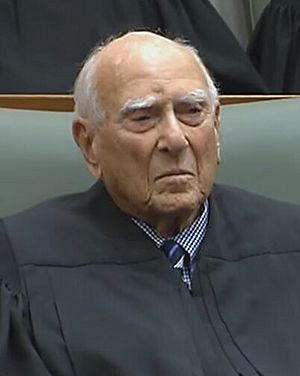Jack B. Weinstein facts for kids
Jack Bertrand Weinstein (August 10, 1921 – June 15, 2021) was a federal judge in the United States District Court for the Eastern District of New York. He was known for handling many important cases. Even after he officially became a "senior judge" in 1993, he continued to work on a full schedule of cases until February 2020, when he decided to stop hearing new cases.
Quick facts for kids
Jack B. Weinstein
|
|
|---|---|

Weinstein in 2017
|
|
| Senior Judge of the United States District Court for the Eastern District of New York | |
| In office March 1, 1993 – June 15, 2021 |
|
| Chief Judge of the United States District Court for the Eastern District of New York | |
| In office 1980–1988 |
|
| Preceded by | Jacob Mishler |
| Succeeded by | Thomas Collier Platt Jr. |
| Judge of the United States District Court for the Eastern District of New York | |
| In office April 15, 1967 – March 1, 1993 |
|
| Appointed by | Lyndon B. Johnson |
| Preceded by | Leo F. Rayfiel |
| Succeeded by | John Gleeson |
| Personal details | |
| Born |
Jack Bertrand Weinstein
August 10, 1921 Wichita, Kansas, U.S. |
| Died | June 15, 2021 (aged 99) Great Neck, New York, U.S. |
| Education | Brooklyn College (B.A.) Columbia Law School (LL.B.) |
| Military service | |
| Allegiance | |
| Branch/service | |
| Service years | 1943–1946 |
| Rank | |
| Unit | USS Jallao |
| Battles/wars | World War II |
| Awards | |
Contents
Early Life and Education
Jack Weinstein was born on August 10, 1921, in Wichita, Kansas. He grew up partly in Brooklyn, New York. He went to Abraham Lincoln High School in Brooklyn.
After high school, he earned a Bachelor of Arts degree from Brooklyn College in 1943. He then served as a lieutenant in the United States Navy during World War II, from 1943 to 1946. He worked on a submarine called the USS Jallao. After the war, he studied law and earned a law degree from Columbia Law School in 1948.
Beginning His Legal Career
After finishing law school, Jack Weinstein worked for the NAACP Legal Defense Fund. This group helps fight for civil rights. He was part of the legal team for the famous Brown v. Board of Education case. This case helped end segregation in schools. He also worked on cases about "one person, one vote," which made sure everyone's vote counted equally.
He also worked as a law clerk for a judge named Stanley Fuld. Later, he became a county attorney for Nassau County, New York, from 1955 to 1957. He also taught law at Columbia Law School.
Becoming a Federal Judge
On April 15, 1967, Jack Weinstein became a federal judge for the Eastern District of New York. A federal judge handles cases that involve federal laws or the U.S. Constitution. From 1980 to 1988, he served as the Chief Judge. This means he was the main judge in charge of the court.
As a federal judge, he handled many large cases that involved a lot of people. These were sometimes called "mass tort" cases. For example, he worked on cases related to Agent Orange, asbestos, and tobacco. He was known for taking on many cases from other judges to help resolve them faster. He continued to work full-time even after becoming a senior judge in 1993, until he stopped hearing new cases in 2020.
Important Cases and Actions
Judge Weinstein made many important decisions during his time on the bench.
Cases About Public Safety
In 2008, he ruled in a case where New York City tried to sue gun manufacturers. The city argued that gun makers should be held responsible for gun violence. However, a higher court later said the lawsuit was not allowed because of a law that protects gun companies.
In 2005, he dismissed a lawsuit from Vietnamese people who said they were harmed by Agent Orange. This chemical was used in warfare. Judge Weinstein ruled that using the chemical in war was legal at the time.
Supporting Fairness in Court
In 2017, Judge Weinstein changed his court rules to encourage young female lawyers to speak more in his courtroom. He wanted to make sure everyone had a fair chance to present their case.
He also once said he would look into claims that police officers might have lied in court. He wanted to make sure that people were treated fairly and that the truth came out.
In 2017, he sentenced some gang members for a robbery. However, he also spoke out against "mandatory sentencing." This is when judges have to give a fixed punishment, even if they think a different sentence would be fairer. He believed these fixed rules could sometimes be unfair.
In 2018, he challenged a rule that often protects police officers from lawsuits. He refused to protect officers who were accused of hurting someone who tried to stop them from entering his home without a warrant.
Death
Jack Weinstein passed away on June 15, 2021, at the age of 99. He died in Great Neck, New York, where he had lived for most of his life.
See also
 In Spanish: Jack B. Weinstein para niños
In Spanish: Jack B. Weinstein para niños
- List of Jewish American jurists
- List of United States federal judges by longevity of service
 | William Lucy |
 | Charles Hayes |
 | Cleveland Robinson |



